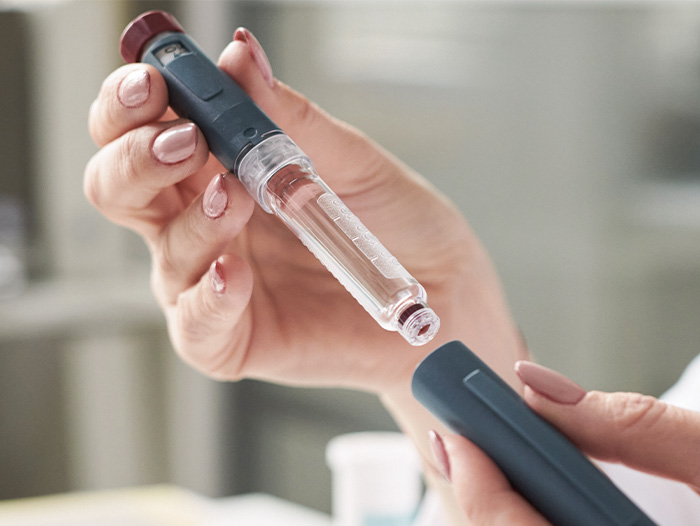Auto logout in seconds.
Continue LogoutAccording to a new study published in Diabetes, Obesity and Metabolism, GLP-1 drugs made food taste sweeter and saltier, which led to reduced appetite, increased satiety, and fewer food cravings among those who used the drugs.
Can GLP-1 drugs change your sense of taste?
For the study, researchers collected information from 411 participants taking GLP-1 medications on potential changes to their sense of taste, appetites, satiety, and food cravings after starting treatment. Among the participants, most of whom were women, 148 were on Ozempic, 217 were on Wegovy, and 46 were on Mounjaro.
The median duration of treatment was similar across all three groups, ranging from 40 to 47 weeks. All participants had received treatment for at least three consecutive months. Participants' average BMIs before starting treatment were also similar: 34.7 (Ozempic), 35.6 (Wegovy), and 36.2 (Mounjaro).
Overall, around a fifth of participants said food tasted sweeter (21.3%) or saltier (22.6%) after taking a GLP-1 drug. Participants did not report any changes to their perception of bitterness or sourness.
Notably, more participants in the Wegovy group (26.7%) reported food tasting saltier than before compared to those in the Ozempic (16.2%) or Mounjaro (15.2%) groups. However, a similar number of participants across all groups reported increases in sweetness (Wegovy 19.4%, Ozempic 21.6%, Mounjaro 21.7%).
In addition, over half of participants reported that their appetite decreased after starting a GLP-1 treatment. Similarly, almost two-thirds of participants reported increased satiety, meaning they felt fuller sooner. Participants also reported reduced food cravings, but this varied by GLP-1 group. More people taking Mounjaro (41.3%) reported reduced food cravings compared to those taking Wegovy (34.1%) or Ozempic (29.7%).
Further analysis also found links between changes in taste perception and appetite/satiety. Participants who reported food tasting sweeter after taking GLP-1s were twice as likely to report increased satiety, 67% more likely to report a reduction in appetite, and 85% more likely to report a reduction in food cravings. Similarly, participants who reported food tasting saltier than before were 2.17 times more likely to report increased satiety.
However, researchers did not find an association between changes in taste perception and BMI reduction. According to the researchers, this may be because sense of taste is only one factor involved in weight loss.
"Shifts in taste may affect how satisfying or appealing food feels in the moment, which influences appetite control, " said Othmar Moser, a professor at the University of Bayreuth in Germany who led the study. "However, weight loss depends on many other factors — like metabolism, long-term eating patterns, and activity — so changes to taste alone may not be enough to directly drive body weight reduction."
Advisory Board's weight management-related resources
Commentary
This study adds to growing research on GLP-1 medications and taste perception. Previously, animal studies found that GLP-1 signaling is involved in taste sensitivity, particularly with sweet tastes. A small study also found that those taking a GLP-1 drug were more sensitive to taste than those taking a placebo.
Although it's still not clear how GLP-1s change taste perception, some health experts say it may be related to hormonal changes.
"These medications act on hormones that can affect taste," said Mir Ali, medical director of MemorialCare Surgical Weight Loss Center at Orange Coast Medical Center, noting that patients who undergo gastric bypass may also experience changes to their gut hormones that can change their sense of taste.
Moser expressed a similar sentiment, saying that GLP-1s "act not only in the gut and brain areas that control hunger but also on taste bud cells and brain regions that process taste and reward. This means they can subtly change how strong flavours, like sweetness or saltiness, are perceived."
According to Moser, the study's findings could help inform new weight-loss treatments or help healthcare providers tailor treatments for specific patients.
"For clinical practice, this suggests that monitoring patients' taste changes could provide useful clues about treatment response, even though taste alone does not directly drive weight loss," Moser said. "It could also perhaps be used to tailor dietary advice, for example by helping patients find alternatives to foods with flavours that have become overwhelming or less appealing."
"Overall, this seems to have a positive effect," Ali said. "Maybe healthy foods that didn’t taste as good in the past now taste better. Patients may be more likely to switch to eating healthy foods if their tastes are different."
(ScienceDaily, 9/16; Miller, Women's Health, 9/18; Newman, Healthline, 6/1/24)
Don't miss out on the latest Advisory Board insights
Create your free account to access 1 resource, including the latest research and webinars.
Want access without creating an account?
You have 1 free members-only resource remaining this month.
1 free members-only resources remaining
1 free members-only resources remaining
You've reached your limit of free insights
Become a member to access all of Advisory Board's resources, events, and experts
Never miss out on the latest innovative health care content tailored to you.
Benefits include:
You've reached your limit of free insights
Become a member to access all of Advisory Board's resources, events, and experts
Never miss out on the latest innovative health care content tailored to you.
Benefits include:
This content is available through your Curated Research partnership with Advisory Board. Click on ‘view this resource’ to read the full piece
Email ask@advisory.com to learn more
Click on ‘Become a Member’ to learn about the benefits of a Full-Access partnership with Advisory Board
Never miss out on the latest innovative health care content tailored to you.
Benefits Include:
This is for members only. Learn more.
Click on ‘Become a Member’ to learn about the benefits of a Full-Access partnership with Advisory Board
Never miss out on the latest innovative health care content tailored to you.



